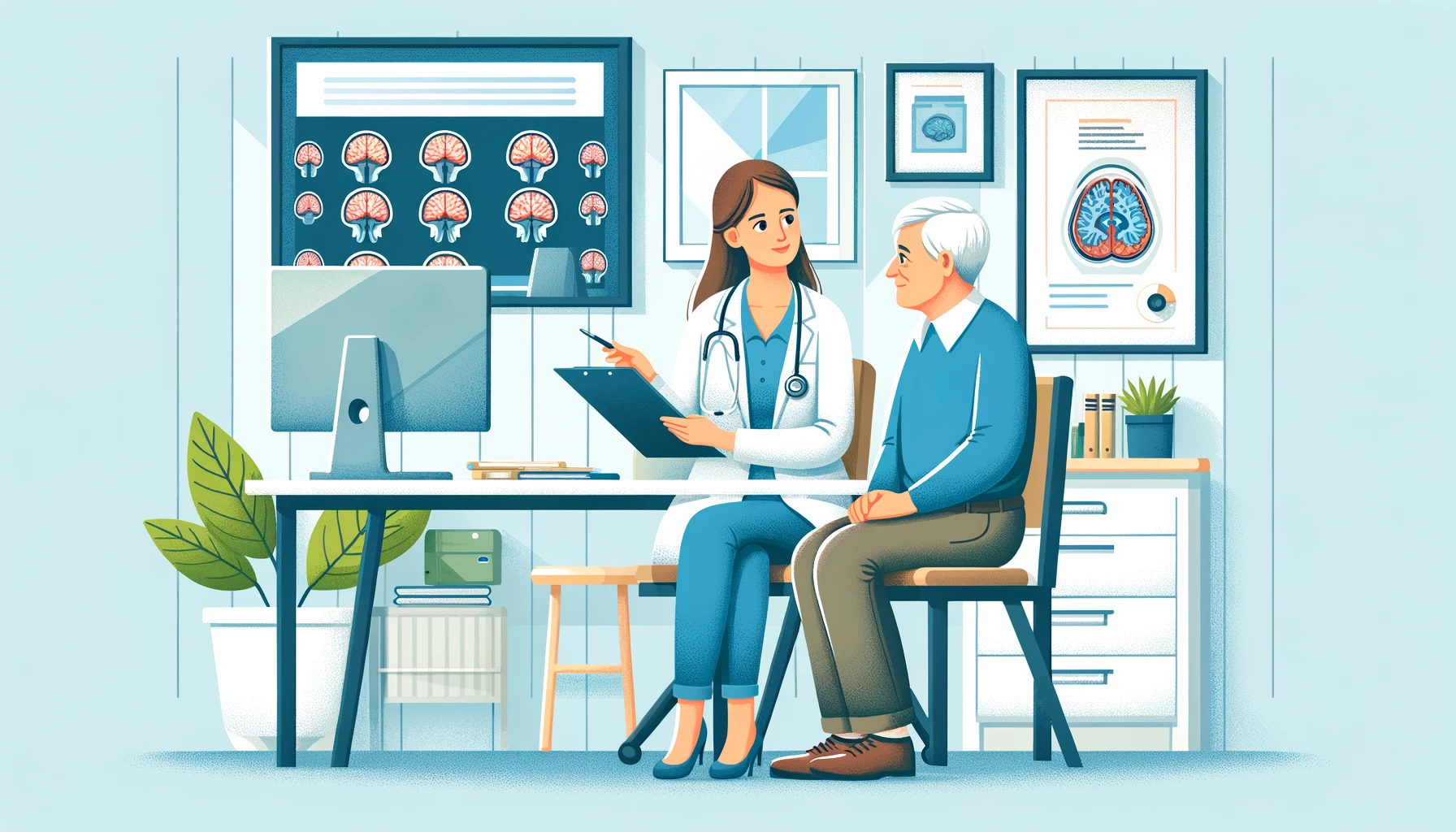認知症とMCI(軽度認知障害)の高齢者増加を英語で説明・紹介するための基本情報と、英会話に役立つ表現をシンプルでわかりやすい英語で紹介します。
英会話ダイアローグ・関連情報・10の質問を通して、認知症に関する英語表現を学びます。
英語
英会話ダイアローグを読む前に知っておくと良い前提知識と情報は以下の通りです。
- 認知症と軽度認知障害(MCI)の違い
- 認知症は日常生活に大きく影響する認知能力の低下ですが、MCIは軽度の認知機能障害で、日常生活には大きくは影響しませんが、将来的に認知症に進行するリスクが高まります。
- 高齢者の増加と社会への影響
- 日本の高齢者人口は増加しており、認知症やMCIの高齢者も増えるため、社会的なサポートや医療インフラの強化が必要です。
- 地域社会でのサポートと予防策
- 早期発見や健康習慣の推進、地域コミュニティの支援が、認知症やMCIの予防と管理に効果的です。
認知症と軽度認知障害(MCI)の高齢者の将来推計に関して話してます。
将来的に認知症とMCIの患者数が増加すること、それに伴う社会の対応、早期発見やライフスタイルの調整の重要性を話題にしています。また、地域社会のサポートや教育の必要性にも触れています。
会話 / dialogue

Hey Key, have you heard about the latest projections from the Ministry of Health regarding dementia and MCI?

Yes, I saw that. It’s quite concerning, isn’t it? They’re expecting the numbers to really go up by 2040.

Exactly, from 4.43 million to 5.84 million for dementia, and MCI numbers might jump from 5.58 million to about 6.12 million.

That’s a lot of people. What’s the difference between dementia and MCI?

Well, dementia involves a significant decline in cognitive abilities that affects daily life. MCI, on the other hand, is a milder form of cognitive impairment. It doesn’t interfere much with daily activities but increases the risk of developing dementia.

I see. With the aging population, I guess more community support and health services will be needed.

Definitely. The Ministry emphasized the need for environments where even those with dementia can live independently as much as possible.

It makes me think about the importance of early detection and lifestyle adjustments. Maybe things like diet, exercise, and mental exercises?

Right. They also mentioned the importance of community awareness and preparing to support these increasing numbers.

Do you think there are enough initiatives in place currently?

Not really. There’s a lot to be done in terms of infrastructure and public awareness. It’s a big task but essential for creating a supportive community.

Agreed. Maybe we can volunteer in some local programs or initiatives. It might be a good way to help out and learn more about these conditions.

That’s a great idea! Let’s look into that. Helping out could give us a better understanding and make a real difference.
関連情報 / related information
「認知症と軽度認知障害」について、理解を深めるための「英語での関連情報」です。
認知症と軽度認知障害(MCI)

What is Dementia?
Dementia is a medical condition that involves a significant decline in cognitive functions such as memory, thinking, and reasoning, to a degree that interferes with daily life and activities. It is not a specific disease but a general term for the impaired ability to remember, think, or make decisions.
What is Mild Cognitive Impairment (MCI)?
Mild Cognitive Impairment (MCI) is a slight decline in cognitive abilities that is noticeable but not severe enough to significantly impair daily activities. People with MCI are at an increased risk of developing dementia, although not all will progress to this more severe condition.
Impact on Society
With the aging population, both conditions are becoming more common, stressing the need for effective healthcare strategies and community support systems. As the number of elderly individuals increases, there is a growing demand for medical and social services to help manage these cognitive impairments.
Prevention and Management
Preventing and managing dementia and MCI involves promoting healthy lifestyles, including diet, exercise, and mental activities, alongside early detection and medical intervention. Community support and awareness are also crucial in helping those affected maintain a quality of life.
Future Projections
Recent studies by health ministries forecast a significant increase in the number of elderly people with dementia and MCI. By 2040, the number of individuals with dementia is expected to rise from 4.43 million to 5.84 million, and those with MCI from 5.58 million to about 6.12 million. This highlights the urgency for enhanced healthcare services and support systems.
10の質問 / 10 questions
「認知症と軽度認知障害」について、理解を深めるための「英語での10の質問」です。
1: What is dementia?
Dementia is a condition that affects the brain, leading to a decline in cognitive function. This affects memory, thinking, language, and the ability to perform everyday activities.
2: What causes dementia?
Dementia is caused by damage to brain cells. This damage interferes with the ability of brain cells to communicate with each other, affecting behavior, feelings, and thinking.
3: Are there different types of dementia?
Yes, there are several types of dementia, including Alzheimer's disease, vascular dementia, Lewy body dementia, and frontotemporal dementia.
4: Who is at risk of developing dementia?
Risk factors for dementia include aging, family history of dementia, poor heart health, and having conditions like hypertension or diabetes.
5: Can dementia be prevented?
While not all causes of dementia can be prevented, some lifestyle choices such as maintaining a healthy diet, regular exercise, and not smoking can reduce the risk.
6: How is dementia diagnosed?
Dementia is diagnosed through a combination of medical history assessment, physical examination, neurological tests, and sometimes brain imaging.
7: What are the symptoms of dementia?
Symptoms of dementia include memory loss, confusion, personality changes, disorientation, and difficulty with communication and reasoning.
8: How is dementia treated?
Treatment for dementia depends on the type but generally includes medications, cognitive therapy, and lifestyle changes to help manage symptoms.
9: Can dementia get worse over time?
Yes, dementia is a progressive condition, which means it can get worse over time. The rate of progression varies depending on the type of dementia and the individual.
10: How can families support a relative with dementia?
Families can support a relative with dementia by ensuring they live in a safe and supportive environment, helping manage their daily activities, and being patient and understanding as they cope with the condition.
和訳付
会話 / dialogue

Hey Key, have you heard about the latest projections from the Ministry of Health regarding dementia and MCI?
ねえキー、厚生労働省の認知症とMCIに関する最新の予測を聞いた?

Yes, I saw that. It’s quite concerning, isn’t it? They’re expecting the numbers to really go up by 2040.
うん、それを見たよ。かなり心配だよね? 2040年までには数がかなり増えると見込まれているんだ。

Exactly, from 4.43 million to 5.84 million for dementia, and MCI numbers might jump from 5.58 million to about 6.12 million.
その通り、認知症は443万人から584万人へ、そしてMCIは558万人から約612万人へと跳ね上がるかもしれないんだ。

That’s a lot of people. What’s the difference between dementia and MCI?
それは多くの人々だね。認知症とMCIの違いは何?

Well, dementia involves a significant decline in cognitive abilities that affects daily life. MCI, on the other hand, is a milder form of cognitive impairment. It doesn’t interfere much with daily activities but increases the risk of developing dementia.
ええと、認知症は日常生活に影響を与える認知能力の顕著な低下を伴うんだ。一方、MCIはより軽度の認知障害で、日常活動にはあまり干渉しないが、認知症になるリスクは高まるよ。

I see. With the aging population, I guess more community support and health services will be needed.
なるほどね。高齢化が進むにつれて、より多くの地域社会のサポートと健康サービスが必要になるだろうね。

Definitely. The Ministry emphasized the need for environments where even those with dementia can live independently as much as possible.
確かに。厚生労働省は、認知症の人でもできるだけ独立して生活できる環境の必要性を強調しているんだ。

It makes me think about the importance of early detection and lifestyle adjustments. Maybe things like diet, exercise, and mental exercises?
それは私に早期発見とライフスタイルの調整の重要性を考えさせるね。食事や運動、そしてメンタルエクササイズのようなことかな?

Right. They also mentioned the importance of community awareness and preparing to support these increasing numbers.
その通り。彼らはまた、地域社会の意識とこれらの増加する数をサポートする準備の重要性についても言及していたよ。

Do you think there are enough initiatives in place currently?
現在、十分な取り組みが行われていると思う?

Not really. There’s a lot to be done in terms of infrastructure and public awareness. It’s a big task but essential for creating a supportive community.
そうではないね。インフラと公衆の意識に関してはまだ多くのことが行われる必要がある。大きな課題だけど、支援的なコミュニティを作るためには不可欠だよ。

Agreed. Maybe we can volunteer in some local programs or initiatives. It might be a good way to help out and learn more about these conditions.
同意するよ。地域のプログラムやイニシアティブでボランティアをするのもいいかもしれないね。これらの状態についてもっと学び、助ける良い方法かもしれない。

That’s a great idea! Let’s look into that. Helping out could give us a better understanding and make a real difference.
それは素晴らしいアイデアだ!調べてみよう。手伝うことで、私たちもより良く理解でき、実際に違いを生むことができるだろう。
関連情報 / related information
認知症と軽度認知障害(MCI)

What is Dementia?
Dementia is a medical condition that involves a significant decline in cognitive functions such as memory, thinking, and reasoning, to a degree that interferes with daily life and activities. It is not a specific disease but a general term for the impaired ability to remember, think, or make decisions.
認知症とは何か?
認知症は、記憶、思考、推理などの認知機能が大幅に低下し、日常生活や活動に支障をきたす医学的状態です。これは特定の病気ではなく、思い出す能力、考える能力、または判断する能力が損なわれることを一般的に表す用語です。
What is Mild Cognitive Impairment (MCI)?
Mild Cognitive Impairment (MCI) is a slight decline in cognitive abilities that is noticeable but not severe enough to significantly impair daily activities. People with MCI are at an increased risk of developing dementia, although not all will progress to this more severe condition.
軽度認知障害(MCI)とは何か?
軽度認知障害(MCI)は、認知能力がわずかに低下し、気付かれるものの、日常活動に大きな支障をきたすほどではない状態です。MCIの人は認知症に進行するリスクが高まりますが、すべての人がこのより重篤な状態に進行するわけではありません。
Impact on Society
With the aging population, both conditions are becoming more common, stressing the need for effective healthcare strategies and community support systems. As the number of elderly individuals increases, there is a growing demand for medical and social services to help manage these cognitive impairments.
社会への影響
高齢化が進むにつれて、これらの状態が一般的になり、効果的な医療戦略とコミュニティサポートシステムの必要性が強調されています。高齢者の数が増加するにつれて、これらの認知障害を管理するための医療および社会サービスの需要が増えています。
Prevention and Management
Preventing and managing dementia and MCI involves promoting healthy lifestyles, including diet, exercise, and mental activities, alongside early detection and medical intervention. Community support and awareness are also crucial in helping those affected maintain a quality of life.
予防と管理
認知症とMCIの予防と管理には、健康的なライフスタイルの促進(食事、運動、精神活動など)、早期発見、医療介入が含まれます。コミュニティのサポートと意識も、影響を受けた人々が生活の質を維持するのに重要です。
Future Projections
Recent studies by health ministries forecast a significant increase in the number of elderly people with dementia and MCI. By 2040, the number of individuals with dementia is expected to rise from 4.43 million to 5.84 million, and those with MCI from 5.58 million to about 6.12 million. This highlights the urgency for enhanced healthcare services and support systems.
将来の予測
厚生労働省の最近の研究によると、認知症およびMCIの高齢者の数は大幅に増加すると予測されています。2040年までには、認知症の人数が443万人から584万人に、MCIの人数が558万人から約612万人に増加すると見込まれています。これは、医療サービスとサポートシステムの強化の必要性を強調しています。これにより、社会全体として高齢者の認知障害への対応を改善することが急務とされています。
10の質問 / 10 questions
1: What is dementia?
認知症とは何ですか?
Dementia is a condition that affects the brain, leading to a decline in cognitive function. This affects memory, thinking, language, and the ability to perform everyday activities.
認知症は脳に影響を与える病状で、認知機能の低下を引き起こします。これにより記憶、思考、言語、日常活動の能力に影響が出ます。
2: What causes dementia?
認知症の原因は何ですか?
Dementia is caused by damage to brain cells. This damage interferes with the ability of brain cells to communicate with each other, affecting behavior, feelings, and thinking.
認知症は脳細胞の損傷によって引き起こされます。この損傷は脳細胞同士のコミュニケーション能力に干渉し、行動、感情、思考に影響を与えます。
3: Are there different types of dementia?
認知症には異なるタイプがありますか?
Yes, there are several types of dementia, including Alzheimer's disease, vascular dementia, Lewy body dementia, and frontotemporal dementia.
はい、アルツハイマー病、血管性認知症、レビー小体型認知症、前頭側頭型認知症を含む、いくつかのタイプの認知症があります。
4: Who is at risk of developing dementia?
誰が認知症を発症するリスクがありますか?
Risk factors for dementia include aging, family history of dementia, poor heart health, and having conditions like hypertension or diabetes.
認知症のリスク要因には、加齢、家族歴、心臓の健康不良、高血圧や糖尿病のような状態が含まれます。
5: Can dementia be prevented?
認知症は予防できますか?
While not all causes of dementia can be prevented, some lifestyle choices such as maintaining a healthy diet, regular exercise, and not smoking can reduce the risk.
認知症のすべての原因を予防することはできませんが、健康的な食事を維持すること、定期的な運動、喫煙しないといったライフスタイルの選択がリスクを減少させることができます。
6: How is dementia diagnosed?
認知症はどのように診断されますか?
Dementia is diagnosed through a combination of medical history assessment, physical examination, neurological tests, and sometimes brain imaging.
認知症の診断は、医療歴の評価、身体検査、神経学的検査、場合によっては脳の画像診断を組み合わせて行われます。
7: What are the symptoms of dementia?
認知症の症状は何ですか?
Symptoms of dementia include memory loss, confusion, personality changes, disorientation, and difficulty with communication and reasoning.
認知症の症状には、記憶喪失、混乱、人格の変化、見当識障害、コミュニケーションと推論の困難が含まれます。
8: How is dementia treated?
認知症はどのように治療されますか?
Treatment for dementia depends on the type but generally includes medications, cognitive therapy, and lifestyle changes to help manage symptoms.
認知症の治療はタイプに依存しますが、一般的には薬物治療、認知療法、症状の管理を助けるためのライフスタイルの変更が含まれます。
9: Can dementia get worse over time?
認知症は時間とともに悪化しますか?
Yes, dementia is a progressive condition, which means it can get worse over time. The rate of progression varies depending on the type of dementia and the individual.
はい、認知症は進行性の状態であり、時間とともに悪化することがあります。進行の速度は認知症のタイプと個人によって異なります。
10: How can families support a relative with dementia?
家族は認知症の親族をどのようにサポートできますか?
Families can support a relative with dementia by ensuring they live in a safe and supportive environment, helping manage their daily activities, and being patient and understanding as they cope with the condition.
家族は、安全でサポートのある環境で生活できるようにすること、日常活動の管理を手伝うこと、そして状態に対処する際に忍耐強く理解を示すことで、認知症の親族をサポートできます。
words & phrases
英会話ダイアローグと関連情報に出てきた単語・フレーズです(例文は各3つ)。

projections : 名詞
意味:予測、見積もり。Estimates or forecasts of future events or performance.
(将来の認知症とMCIの患者数の増加についての予測を指す)
例文:
The company’s financial projections were optimistic.
「その会社の財務予測は楽観的でした。」
Climate projections indicate a warmer planet.
「気候予測によると、地球はより暖かくなるとされています。」
Accurate projections help businesses plan for the future.
「正確な予測は企業が将来の計画を立てるのに役立ちます。」
cognitive : 形容詞
意味:認知の、認識の。Related to mental processes of perception, memory, judgment, and reasoning.
(認知能力の低下を説明するために使用される)
例文:
Cognitive abilities decline with age.
「認知能力は年齢とともに低下します。」
The test measures different cognitive functions.
「そのテストはさまざまな認知機能を測定します。」
She attended a workshop to improve her cognitive skills.
「彼女は認知スキルを向上させるためのワークショップに参加しました。」
impairment : 名詞
意味:障害、機能障害。A condition in which a part of the body or mind is damaged and does not work well.
(認知障害(MCI)を指すために使用される)
例文:
Hearing impairment can affect communication.
「聴覚障害はコミュニケーションに影響を与えることがあります。」
The accident caused permanent physical impairment.
「その事故により永久的な身体障害が発生しました。」
Cognitive impairment affects memory and thinking.
「認知障害は記憶と思考に影響を与えます。」
interfere : 動詞
意味:干渉する、邪魔をする。To come into opposition, often negatively impacting something.
(認知症が日常生活に干渉することを指す)
例文:
Please don’t interfere with my work.
「私の仕事に干渉しないでください。」
Noise can interfere with sleep.
「騒音は睡眠に干渉することがあります。」
Medications can sometimes interfere with each other.
「薬は時に他の薬と干渉することがあります。」
initiatives : 名詞
意味:主導権、新たな計画。Actions intended to resolve a problem or improve a situation; a fresh approach to something.
(認知症とMCIの対策としての新しい計画や取り組みを指す)
例文:
The government launched new initiatives to tackle pollution.
「政府は汚染に対処するための新しい取り組みを開始しました。」
Community initiatives can greatly improve neighborhood safety.
「地域社会の取り組みは地域の安全を大幅に向上させることができます。」
She took the initiative to organize a community clean-up.
「彼女は地域の清掃活動を組織するという主導権を取りました。」
